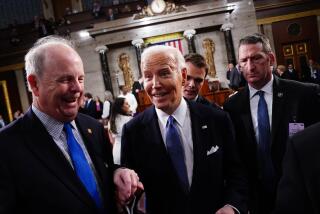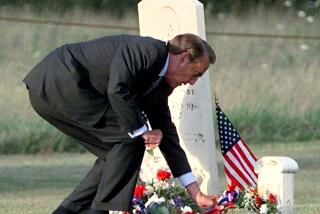Campaign ’96 : ON THE TRAIL : Dole Pumps Up His Speaking Style After Deflating N.H. Loss : The Kansas senator’s efforts to draw a clear distinction between himself and rival Patrick J. Buchanan carry an energy that his typically rambling speeches previously lacked.
WILSONVILLE, Ore. — Something is happening to Bob Dole’s campaign speeches. Slowly and laboriously, they’re getting better.
Since leaving New Hampshire, where the telegenic charm and fiery rhetoric of Republican rival Patrick J. Buchanan outpaced a dour and unexpressive Dole on the stump--and ultimately in the polls--the plain-spoken Senate majority leader has breathed a degree of passion into the words he long has used as his central message to voters.
Now that Buchanan’s campaign is ascending in the GOP presidential race, Dole is talking about his leadership skills, his experience, his understanding of government with a new urgency and bite.
“We’re not electing a talk-show host,” he has taken to saying, in a reference to Buchanan’s background. “We are electing someone to preside over foreign policy, someone to preside over the economy.”
Perhaps more important, his efforts to draw a clear distinction between himself and Buchanan, to define the nomination contest as pitting “the mainstream” against “the extreme,” carry an energy that his typically rambling speeches previously lacked.
*
Whether the improvements are dramatic enough to make a difference remains to be seen. Although Dole has spent more than 35 years debating issues in Congress, lecturing to civic groups and setting a record for number of appearances on NBC’s “Meet the Press,” public speaking is an ordeal for him, not a measure of his talents.
James Humes, a Philadelphia speech writer who has written for every GOP president since Dwight D. Eisenhower, heard Dole speak during the New Hampshire primary. He judged his presentation “miserable.”
Said Humes: “Bob Dole is a magnificent politician who is showing some trouble transitioning into a campaign style of speaking. He’s going to get it, but he hasn’t gotten it yet.”
Dole’s new voice initially appeared at a town rally earlier this week before about 1,000 supporters in Fargo, N.D., where he sought to bury his old campaign style. “I have returned to the heartland of America to fight for the heart and soul of the Republican Party,” Dole said.
That refrain has become the battle cry of Dole’s no longer front-running campaign. As he repeats the line like a mantra in every speech, Dole resembles a proud champion boxer, stunned momentarily by a lesser contender’s lucky punch yet still cocky enough to believe he will eventually win the fight.
“We’ve got a good message,” Dole now says. “It’s going to be stronger and stronger as we go along. You’re going to see the real Bob Dole out there from now on.”
Although Dole’s pumped-up oratory has given meaning and direction to his campaign, it has also drawn friendly fire from Republican Party activists who fear his combative rhetoric may drive ultraconservative voters away from the party if Buchanan isn’t the nominee.
Indeed, the challenge for Dole is to modulate his “mainstream versus extreme” call to arms without alienating potential GOP voters. This may prove a fine distinction to make for a candidate who has had trouble delivering a consistently persuasive stump message.
As he campaigned in Oregon on Friday, Dole’s effort to walk this line found him labeling Buchanan’s ideas as “extreme” without actually calling the conservative commentator himself an “extremist.”
Campaign aides say Dole emerged from the close, losing effort in New Hampshire convinced that he needed to find a new and persuasive voice to connect more with voters. While they contend that Dole’s message touting his experience and leadership remains his primary argument for his winning the nomination, some expressed private concerns that it wasn’t working effectively enough to move voters.
Dole himself has acknowledged that, when it comes to speaking into news cameras or arguing in political sound bites--not only against Buchanan but, he hopes, against President Clinton in the fall--he is at a disadvantage.
“I think I need to work on that a bit probably,” Dole told reporters who inquired about his passionless speeches during the New Hampshire campaign. “It’s got to be real, though. It’s got to be genuine. I can’t get up, you push a button and then you get the message. I am what I am.”
Longtime observers say public boasting, so vital in a national political campaign that is largely conducted through the media, doesn’t come easily to Dole. He’s a no-nonsense legislative negotiator, a man more comfortable twisting arms on Capitol Hill than pressing palms on Main Street, they say.
“In the Senate, [speaking] is a mechanical thing to debate an issue, and he’s much more relaxed because he knows the style of doing it,” Sen. Hank Brown (R-Colo.), said after watching Dole address a small group at a manufacturing facility near Denver earlier this week. “It comes off much better in the Senate than out here on the campaign.”
Sen. Robert F. Bennett (R-Utah) said Dole is “very effective” as a speaker in cloakroom debates and on the floor, but he suffers when projected as a televised image.
He compared Dole to former President Bush, whose occasional malapropisms and snarled syntax made him appear confused at times. “It’s hard for [Dole] to read off a TelePrompTer,” said Bennett. “Even President Bush was not at his best when campaigning.”
Of course, the comparison with Bush can hardly be cheering for Dole, given the former president’s loss of the last election.
Dole’s campaign speeches often wander aimlessly from idea to idea, jumping from one point to another without transitions. Instead of seamlessly moving through his remarks, Dole tends to employ meaningless phrases, such as the word whatever, to advance his message.
He rarely speaks from a prepared text and often seems impatient for the applause that punctuates his best lines, waving to silence the audience. He switches from first person to referring to himself in third person, frequently within the same passage.
*
And his speeches almost never rally to a climactic crescendo; whenever Dole senses he’s done telling people why they should vote for him, he just stops with a wave and says, “God bless America.”
There is no doubt, however, that Dole is showing signs of improvement. He’s experimenting with various pitches to his deep and sandpapery voice, inflecting it on occasion with flashes of enthusiasm.
Traces of emotion spill along the edges as he tells audiences of his hardscrabble life in Depression-era Kansas and his parents’ poverty of wealth and abundance of values.
Most revealingly, he’s willing more and more to speak of being shot in World War II, and of his lengthy recovery from wounds that almost killed him and left his right shoulder incapacitated.
In suburban Denver on Thursday, he not only broached the subject, but phrased it in a way that contrasted with Buchanan’s tenure on the CNN talk show “Crossfire.”
“I’m a good leader,” Dole told a breakfast meeting of the Englewood Chamber of Commerce. “I’ve been in the real cross-fire, and it wasn’t on television. It was over in Italy somewhere a long time ago.”
As Humes sees it, Dole’s greatest attribute is also his worst feature as a speaker.
“He has a great story to tell, but he seems absolutely reluctant to tell it,” Humes said, referring to Dole’s World War II experiences.
“Maybe what happened to him in New Hampshire is a blessing in disguise,” Humes added. “Losing there is going to force him to develop a polished message.”
More to Read
Get the L.A. Times Politics newsletter
Deeply reported insights into legislation, politics and policy from Sacramento, Washington and beyond. In your inbox three times per week.
You may occasionally receive promotional content from the Los Angeles Times.










